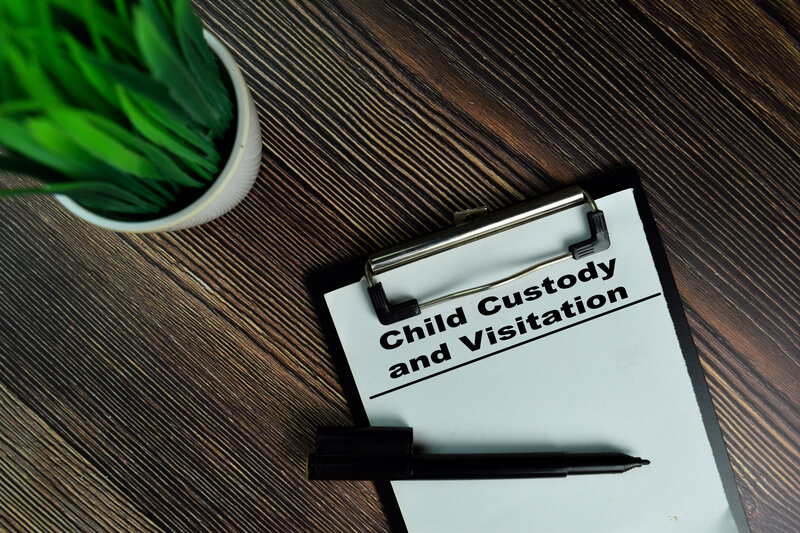If you face divorce and a child custody dispute is a factor, you could experience intense feelings throughout the process. You will benefit significantly if you and your spouse participate in mediation to discuss child custody arrangements. You will have much more freedom to make choices than you’d have if you were in a courtroom, as well as your lawyer being present to assist you during each session. However, this doesn’t prohibit the possibility of passionate debates on occasionally touchy subjects. If you allow your feelings to rule your speech, you’ll make statements that prevent you from obtaining the agreement you want.
This article will tackle what not to say in child custody mediation. Here are some things you should never mention during talks if you participate in mediation.
Understanding the Importance of Mediation
Child custody mediation plays a crucial role in resolving disputes between parents without going to trial. It provides a platform for discussion and negotiation, aiming to find the best interest of the child through effective communication and mutual respect. The goal of mediation is to reach a settlement that both parties can agree upon, promoting a cooperative co-parenting relationship. Emotions can run high during these sessions, making it important for parents to remain calm and focused on finding a solution. Understanding the importance of this process can help parents navigate mediation with a clear mind and a positive outlook.

What Is Child Custody Mediation?
Child custody mediation is a process designed to help divorcing or separating parents resolve disputes regarding the custody and visitation of their children. The sessions are intended to help the parties decide the most efficient, expeditious way and agree on ways to divide child support obligations and child custody between them. A confidential and courteous conversation will be encouraged to promote candid and honest.
The mediator assists the parties in identifying and resolving their conflicts. The mediator’s job is crucial for reducing misunderstandings, outlining the objectives and interests of the parents, and investigating alternatives, particularly ones that the parents could never have considered. This person could be a family therapist, social worker, psychologist, or another court professional who works in private practice.
To resolve issues like parenting time, obligations, child custody, and visitation, a mediator will collaborate with both parents of the child. Private mediation requested by the parents is one option, while court-ordered mediation is another.
Mediation promotes joint resolution and assists in avoiding tense courtroom proceedings. If a judge must decide on parenting matters, neither party may be pleased with the outcome. Even if the answers aren’t what the parents initially desired for themselves, mediation allows them to create solutions they are both content with—the sessions center on the problems the parents struggle to solve. The focus of the sessions, for instance, might be on the child’s school if the parents largely concur on everything else.
While mediation is frequently effective, it is only sometimes successful. If one or both parties don’t approach it with willingness and an open mind to discover solutions advantageous to both the parents and the children, it is more likely to fail.
The parents frequently hold divergent opinions on a wide range of topics. Parenting time, holidays and school breaks, decision-making power, extracurricular activities, religion, education, and other concerns are often addressed in mediation with the support of the parents. Whatever the subject, there are always things to avoid saying in mediation about child custody. Always work to protect your kids’ interests, and concentrate on finding ways to give them access to both parents.
In Nevada, a child custody case or divorce must be served and filed within 90 days of the court setting up a case-management conference. The judge arranges mediation if the parents cannot agree on child custody during that initial conference.
If mediation has been ineffective in the past or the abuse is an issue, such as when one parent receives an order of protection from the other, a judge may decide to forego it. If the dispute is fiercely contested and both parties concur that mediation would be pointless, it may also be waived. It is doubtful that a judge would forego mediation so that you or your ex-spouse may proceed directly to litigating your parental rights in court.
Your initial mediation appointment could take a little while, especially if it is court-mandated. In the Las Vegas area, the first mediation session may occur approximately two months or even longer after the judge has entered the mediation order. However, it’s important to note that specific timelines and schedules can vary depending on various factors, including the court’s caseload and availability.
Private mediation allows flexibility in the number of sessions that can be utilized. Sessions mandated by the court typically occur once or twice, lasting up to a few hours each.
Both parties typically share the costs in private mediation. In some jurisdictions, court-ordered mediation is free. Where it isn’t, the court determines how the costs are divided and, if the parents qualify, can schedule reduced-cost or free mediation.
The parents may ask for separate mediation sessions during private mediation to discuss how to distribute their assets and debts and other divorce-related matters. It may be the same mediator if they are engaging in private mediation.
If mediation is unsuccessful, the court can assign a guardian ad litem (“GAL”), an attorney serving the children’s best interests. This person visits the children and their parents to assess the family dynamic and go over the present and suggested parenting arrangements. The court receives recommendations from this representative on parenting time and custody of the children. Since the GAL spent hours interviewing the parties, children, and other witnesses, judges typically, but only sometimes, follow their recommendations.
The parties may appoint a parenting coordinator if the guardian ad litem and mediation prove ineffective. This person spends much more time on the case to comprehend the numerous players and dynamics. This person frequently has experience in both mediation and law. Protecting children from conflict, assisting the parents in resolving their disagreements, and preserving the children’s ties with their parents as much as possible are all important objectives of the parenting coordinator.
Sometimes, parenting coordinators can make impromptu decisions. Although the judge is not required to abide by their recommendations for long-term custody and parenting time, they frequently do.

How To Prepare for Child Custody Mediation?
Obtain enough sleep the night before to ensure the best possible mediation sessions. Consider the important points to you and how you would talk about them. Additionally, you should be aware of the non-negotiable from the other parent and possible areas of agreement between the two of you.
Be aware of any worries the other parent might have. The parent can be concerned about your work commute, new dating relationships, substance misuse, or another issue. Be prepared to explain why your parenting goals are consistent with their concerns.
Be as specific as you can when outlining your thoughts or potential parenting plan, and follow your rationale to its logical conclusion. For instance, keeping track of your routine and how it supports caring for your child throughout the week can be helpful if you insist on having them during the week.
Verify again that the person may attend if you asked about bringing a support person and the request was accepted. This person is expected to act impartially and keep quiet. If they disobey the rules or act inappropriately, that can reflect poorly on you. Select a supporter who won’t compromise your argument. Instead of, say, your mother, supporting people ought to be impartial individuals like therapists or child custody lawyers. However, having a close friend or family member present throughout the mediation may significantly enhance your spirits.
Ground Rules and Communication Guidelines
Effective communication is vital in child custody mediation. Setting ground rules helps establish a respectful environment where both parents can voice their concerns and demands without interruption. Legal professionals often recommend working with a child custody lawyer to understand the guidelines and prepare for mediation. It’s important to discuss your goals and develop a strategy that focuses on the child’s best interest. Clear communication guidelines help prevent misunderstandings and ensure that the discussion remains productive. Maintaining respect and understanding throughout the process can significantly enhance the chances of reaching a favorable settlement.
Common Mistakes to Avoid in Mediation
One of the most common mistakes in child custody mediation is letting emotions take over. Parents should avoid making accusations or statements that could be perceived as hostile. It’s essential to focus on providing evidence and discussing facts rather than getting caught up in emotional arguments. Another mistake is failing to listen to the other parent’s perspective. Effective mediation requires an understanding approach, where both parties acknowledge each other’s roles and contributions. Avoiding these common pitfalls can lead to a more constructive and amicable mediation process, ultimately benefiting the child involved.
Negative Statements about the Other Parent
Making negative statements about the other parent is highly discouraged in child custody mediation. Such comments can derail the mediation process and harm the co-parenting relationship. Instead of criticizing, focus on constructive communication that aims to find a solution in the child’s best interest. Respectful dialogue helps build a cooperative atmosphere, facilitating a more effective settlement. Working with your child custody lawyer, you can prepare for mediation by identifying key points and evidence that support your position without resorting to negativity. Keeping the discussion positive and centered on the child’s needs ensures that the mediation process remains productive and forward-looking.
Criticizing Parenting Skills or Choices
In child custody disputes, criticizing the other parent’s skills or choices can escalate tension and hinder productive negotiations. It’s important to remember that mediation is not about placing blame or fault but finding solutions that serve the child’s best interest. Attacking the other parent’s behavior or decisions can lead to defensive reactions and increased frustration, making it harder to reach an agreement on visitation rights or care responsibilities. Instead of focusing on negative aspects, offer constructive ideas and suggestions that could improve the co-parenting situation without resorting to criticism.
Bringing Up Past Relationship Issues
Bringing up past relationship issues during child custody mediation can derail discussions and create unnecessary conflict. Mediation should center around resolving current child custody issues, not rehashing old arguments or placing fault for past problems. Mentioning past grievances can shift the focus away from the child’s needs and towards personal disputes, which is counterproductive. Maintaining a mindset that prioritizes the child’s well-being helps keep the conversation relevant and forward-looking. Focusing on present responsibilities and solutions rather than past conflicts encourages a more collaborative approach to mediation.
Using Children as Pawns or Manipulating Tactics
Using children as pawns or employing manipulative tactics during mediation is detrimental to the process and harmful to the children involved. Statements that imply one parent is using the child to gain leverage can heighten tension and mistrust. Such behavior undermines the goal of creating a fair and balanced co-parenting plan. It’s vital to approach mediation with the understanding that the child’s best interest should guide all decisions. Avoid threats, attacks, or any form of manipulation, as these actions can negatively impact the child’s emotional well-being and the overall mediation outcome.
Making False Accusations or Exaggerations
Making false accusations or exaggerating situations during child custody mediation can severely damage negotiations. False claims can lead to increased litigation, as the accused parent may feel compelled to defend themselves aggressively. This behavior disrupts the mediation process and prolongs the resolution of child custody issues. Providing accurate and honest information helps build trust and facilitates more effective and respectful communication. Working with a mindset of honesty and transparency ensures that both parties can focus on finding practical solutions without the distraction of fabricated disputes.
Tips for Effective and Respectful Communication
Effective communication is key to successful child custody mediation. Here are some tips to ensure respectful and productive discussions:
1. Stay Focused on the Child’s Needs: Keep the conversation centered on what is best for the child, avoiding personal attacks or irrelevant issues.
2. Manage Expectations: Enter mediation with realistic expectations and a willingness to compromise.
3. Use “I” Statements: Express your concerns and ideas using “I” statements to avoid sounding accusatory. For example, “I feel concerned about our child’s education” rather than “You never help with homework.”
4. Listen Actively: Show respect by listening to the other parent’s perspective without interrupting.
5. Avoid Blame and Fault: Focus on solutions rather than assigning blame or fault for past incidents.
6. Keep Emotions in Check: Mediation can be an emotional process, but maintaining a calm demeanor helps prevent escalation and keeps discussions productive.
By adhering to these communication guidelines, parents can navigate child custody mediation with respect and care, ultimately achieving a settlement that benefits everyone involved.
What Not To Say In Child Custody Mediation?
During meditation, you shouldn’t say anything that suggests you aren’t concerned about a child’s needs. Joint custody is frequently the most excellent option for children, both legally and emotionally, as it serves the children’s best interests to have regular contact with both parents. During their mediation sessions, parents should keep this concept in mind.
- Both parents should maintain a professional, calm, and courteous demeanor in the sessions.
- They should keep the conversation narrow and concentrate on the chosen subjects.
- Parents must understand that they can’t always have their way.
- Bringing several scheduling options and parenting plans to the mediation is a good idea.
It is acceptable to be open and honest, but this does not entail insulting the other parent or saying anything harsh that comes to mind. Whatever the mediator writes to the judge about you may not be favorable if you act unethically and mediation is unsuccessful.
Do not insult the other parent, your kids, your in-laws, relatives, the mediator, the judge, or anyone else engaged in the process. That can be challenging when delicate subjects, like drug abuse, are involved. There is a distinction between saying, “She likes to stay up late drinking on weekend nights, so I believe the children are best with me,” and expressing, “She’s a drunk who frequently parties during weekends and shouldn’t have kids.”
The mediator and the parties are frequently the only persons in the room. Each parent may, however, request a third party who is not involved in the discussions and acts as impartial support. Therapists, lawyers, or any other type of advocate are examples of someone who can provide unbiased support. If you go as a support person, be careful not to interrupt parenting debates. Mediators may speak with the involved kids separately.
Final Words
As a father or mother, your children will benefit more from mediation in child custody cases. If you are present, honest, and open, this experience will pass swiftly. Therefore, maintain your composure and patience to make the custody process positive for your children’s future.
Contact A Las Vegas Family Law Attorney
Are you in need of assistance regarding child custody mediation in Las Vegas? Huggins Law Office is here for you.
We understand the importance of reaching a fair and favorable child custody agreement that prioritizes the well-being of your children. Whether you’re going through a divorce or facing custody disputes, our Las Vegas family law attorneys are ready to provide expert tips, guidance, and compassionate representation.
If you have questions or want more information, call us at (702) 387-4014.

